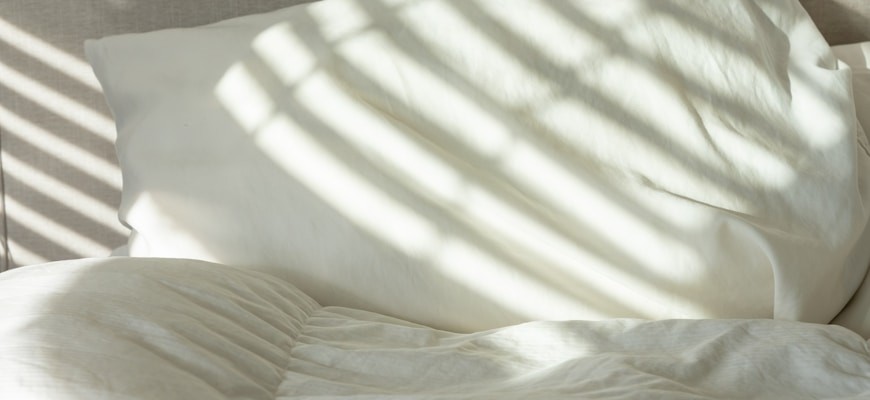- The Hidden Impact of Air Quality on Sleep Quality
- Breathing Easy: How Clean Air Contributes to Restful Nights
- The Connection Between Indoor Air Pollution and Sleep Disorders
- Creating a Sleep Sanctuary: Tips for Improving Air Quality
- The Role of Humidity and Ventilation in Achieving Deep Sleep
- Natural Solutions: How Plants Can Enhance Your Sleep Environment
The Hidden Impact of Air Quality on Sleep Quality
Air quality plays a crucial role in determining sleep quality. Many individuals underestimate how pollutants and irritants in the air can disrupt restful sleep. Poor air quality may lead to a range of sleep disturbances, including difficulty falling asleep, frequent awakenings, and reduced overall sleep efficiency.
When the air is laden with allergens, such as pollen, dust mites, and pet dander, it can trigger respiratory issues that interfere with a peaceful night’s rest. Additionally, volatile organic compounds (VOCs) emitted from household products and furnishings can contribute to sleep problems.
- Respiratory Irritation: Contaminants can cause inflammation in the airways, leading to snoring and sleep apnea.
- Increased Stress Levels: Poor air quality can elevate stress levels, making it harder to relax and unwind before bedtime.
- Disrupted Circadian Rhythms: Certain pollutants can interfere with the body’s natural sleep-wake cycle.
Improving indoor air quality can significantly enhance sleep quality. Regular ventilation, using air purifiers, and minimizing the use of harmful chemicals can create a more conducive environment for restful sleep. Ensuring that the sleeping area is free of allergens and pollutants not only promotes better rest but also contributes to overall health and well-being.
Monitoring air quality through tools or apps can help individuals stay informed about harmful levels of pollutants. Taking proactive measures to improve air quality is essential for achieving sound sleep. By prioritizing clean air, individuals can enhance their sleep quality and enjoy the restorative benefits that come with a good night’s rest.
Breathing Easy: How Clean Air Contributes to Restful Nights
The quality of air plays a crucial role in achieving restful nights. Clean air not only enhances overall health but also significantly contributes to better sleep patterns. Poor air quality can lead to various health issues, which in turn disrupt sleep. A well-ventilated space filled with fresh air promotes relaxation and aids in falling asleep faster.
- Reduction of Allergens: Clean air minimizes allergens such as dust mites, pollen, and pet dander, which can trigger respiratory problems and disturb sleep.
- Temperature Regulation: Proper ventilation helps maintain an optimal sleeping temperature, fostering a more comfortable sleeping environment.
- Improved Oxygen Levels: Fresh air increases oxygen supply, which supports deeper, more restorative sleep cycles.
- Humidity Control: Clean air systems can help regulate humidity levels, preventing dryness or excess moisture that can disrupt sleep.
Investing in air purification and proper ventilation systems can create a healthier sleeping environment. Regularly changing air filters and ensuring adequate airflow can significantly enhance indoor air quality. As a result, individuals may notice an improvement in their sleep quality, leading to more rejuvenating nights.
Additionally, incorporating plants that purify air can further elevate indoor air quality. Certain varieties not only absorb toxins but also release oxygen, contributing to a serene atmosphere conducive to sleep. Overall, embracing the significance of clean air is essential for achieving sound, restorative sleep and overall well-being.
The Connection Between Indoor Air Pollution and Sleep Disorders
Indoor air pollution plays a significant role in sleep quality, impacting various aspects of health and well-being. Poor air quality can lead to sleep disorders, causing disturbances that hinder restful slumber. Common indoor pollutants, such as volatile organic compounds (VOCs), particulate matter, and allergens, can exacerbate respiratory issues and create an environment that is not conducive to sound sleep.
- Volatile Organic Compounds (VOCs): These chemicals, found in household products like paints and cleaners, can irritate the airways and disrupt sleep patterns.
- Particulate Matter: Dust, pet dander, and smoke can infiltrate the air we breathe indoors, leading to discomfort and poor sleep quality.
- Allergens: Indoor allergens such as mold and dust mites can cause allergic reactions, making it difficult to achieve deep, restorative sleep.
While the connection between air quality and sleep is increasingly recognized, many individuals remain unaware of the extent to which poor indoor air can affect their ability to fall asleep and stay asleep. Addressing these pollutants is essential for improving overall air quality and promoting better sleep hygiene.
Implementing air purification systems, ensuring proper ventilation, and regularly cleaning living spaces can significantly enhance indoor air quality. By reducing exposure to harmful substances, individuals can create a healthier sleeping environment that fosters restorative rest.
In conclusion, understanding the link between indoor air pollution and sleep disorders is crucial for anyone seeking a better night’s sleep. Prioritizing air quality is an effective strategy to combat sleep issues and promote overall well-being.
Creating a Sleep Sanctuary: Tips for Improving Air Quality
Creating a sleep sanctuary is essential for enhancing air quality, which directly impacts the quality of sleep. A restful environment significantly contributes to achieving sound sleep, and improving air quality is a crucial step in this process. The following tips can help transform any bedroom into a tranquil retreat.
- Ventilation: Regularly opening windows allows fresh air to circulate, reducing indoor pollutants and increasing oxygen levels.
- Air Purifiers: Investing in a high-quality air purifier can effectively remove allergens, dust, and harmful particles, thereby improving overall air quality.
- Houseplants: Certain plants, such as snake plants and peace lilies, naturally purify the air by absorbing toxins and releasing oxygen, making them excellent additions to a sleep sanctuary.
- Humidity Control: Maintaining optimal humidity levels, ideally between 30-50%, can prevent mold growth and ensure comfortable breathing conditions.
- Regular Cleaning: Frequent dusting and vacuuming help to minimize dust mites and allergens, creating a healthier sleep environment.
- Natural Materials: Using organic bedding and furnishings can reduce exposure to volatile organic compounds (VOCs), which are often found in synthetic materials.
By implementing these strategies, the air quality in a bedroom can be significantly enhanced, leading to improved sleep quality. A clean and fresh sleep environment promotes relaxation and restful sleep, making it vital to prioritize air quality in the quest for sound sleep.
The Role of Humidity and Ventilation in Achieving Deep Sleep
Humidity and ventilation play crucial roles in fostering an environment conducive to deep sleep. Optimal humidity levels in the bedroom can significantly impact sleep quality. When humidity is too low, it can lead to dry skin and respiratory issues, which may disrupt restful slumber. Conversely, excessive humidity can create a muggy atmosphere, making it difficult for the body to cool down during sleep.
Maintaining the right humidity levels, typically between 30% and 50%, is essential for achieving restorative sleep. This balance not only enhances comfort but also supports the body’s natural processes during rest. Proper ventilation helps in regulating humidity levels by allowing fresh air to circulate and preventing the buildup of stale air, which can harbor allergens and irritants.
- Optimal humidity promotes better respiratory function, reducing the risk of sleep disturbances caused by allergies or asthma.
- Regular ventilation helps to remove indoor pollutants, further improving air quality and enhancing sleep quality.
- Maintaining a comfortable temperature through effective airflow aids the body’s thermoregulation, crucial for deep sleep cycles.
Incorporating humidifiers or dehumidifiers can assist in achieving the desired humidity levels, while ensuring windows are opened periodically allows for fresh air intake. This combination of humidity control and proper ventilation not only enhances overall air quality but also contributes to a more peaceful and uninterrupted night’s sleep.
By prioritizing both humidity and ventilation, individuals can create a sleep environment that maximizes comfort and promotes deep, restorative sleep. Understanding the interplay between air quality and sleep is vital for anyone seeking to improve their nightly rest and overall well-being.
Natural Solutions: How Plants Can Enhance Your Sleep Environment
Creating a serene sleep environment is essential for achieving quality rest, and incorporating natural elements like plants can significantly enhance air quality. Certain plants possess unique properties that not only beautify a space but also improve overall well-being by purifying the air. By understanding how these natural solutions work, one can cultivate a more conducive atmosphere for restorative sleep.
- Aloe Vera: Known for its soothing properties, Aloe Vera releases oxygen at night, which can help improve air quality and promote relaxation.
- Peace Lily: This elegant plant is effective in removing toxins from the air, making it an excellent addition to bedrooms for enhancing sleep quality.
- Lavender: The calming fragrance of Lavender not only purifies the air but is also linked to improved sleep patterns, making it a perfect choice for a restful environment.
- Spider Plant: Renowned for its air-purifying abilities, the Spider Plant helps in reducing indoor pollutants, contributing to a healthier atmosphere for sleep.
- Snake Plant: This hardy plant converts CO2 into oxygen during the night, further enhancing the air quality and promoting a peaceful night’s rest.
Integrating these plants into the sleep space can lead to a noticeable improvement in air quality. Better air leads to deeper and more restorative sleep, allowing for rejuvenation. Additionally, the natural beauty of these plants adds to the overall aesthetic of the bedroom, creating a relaxing environment that encourages relaxation and tranquility.
In conclusion, utilizing these natural solutions not only enhances the aesthetic appeal of the sleeping area but also plays a critical role in boosting air quality. A clean, fresh atmosphere is vital for optimal sleep, and incorporating air-purifying plants can significantly contribute to a sound night’s rest. Embracing nature is a simple yet effective strategy to improve overall sleep quality.








